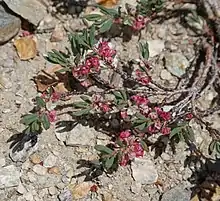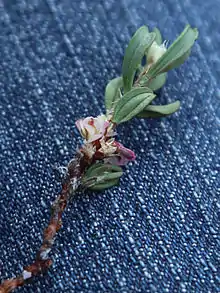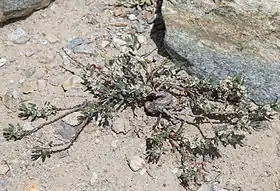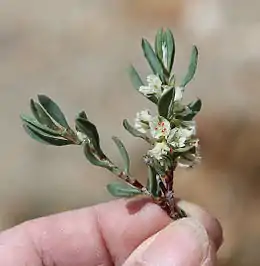Polygonum shastense
Polygonum shastense is a species of flowering plant in the knotweed family known by the common name Shasta knotweed. It is native to sections of southwestern Oregon, northwestern Nevada, and northern and central California,[1] where it grows in rocky and gravelly mountainous habitat up to 3300 meters (11,000 feet) elevation.[2] It is most common in the Sierra Nevada.[3] The species name refers to its occurrence on Mount Shasta in Shasta County, California.[4]
| Polygonum shastense | |
|---|---|
 | |
| Scientific classification | |
| Kingdom: | Plantae |
| Clade: | Tracheophytes |
| Clade: | Angiosperms |
| Clade: | Eudicots |
| Order: | Caryophyllales |
| Family: | Polygonaceae |
| Genus: | Polygonum |
| Species: | P. shastense |
| Binomial name | |
| Polygonum shastense W.H.Brewer 1872 | |
Description
Polygonum shastense is a rather elegant small perennial shrub producing branching tough, gnarled brown stems reaching a maximum length of 40 centimeters (16 inches), growing prostrate along the ground or somewhat upright. The bases of old plants can be wide, woody and gray (see image above left).[5]
The leaves lining the slender but rough stems are uniform in size and distribution, not clustered or reduced in size near stem tips. They are lance-shaped with two parallel veins separating three raised areas on the upper surface (see closeup at left), each leaf measuring 5 to 8 millimeters (0.20–0.32 inches) long.[2] Leaves emerge curled slightly and folded in half lengthwise. Leaves have stipules which are widened into membranous ochrea wrapped around the leaf bases.[5]
Flowers occur in clusters in upper leaf axils. Each is just under a centimeter wide and has five rounded petals, either white with a green stripe or pink with a dark stripe. There are 5–8 stamens and a triangular pistil with a 3-lobed style. Plants may have either all white, all pink, or a mixture of flower colors.[5]



References
- Biota of North America Program 2014 county distribution map
- Norman F. Weeden (1996). A Sierra Nevada Flora (4th ed.). Berkeley: Wilderness Press. ISBN 0-89997-204-7.
- Calflora taxon report, University of California, Polygonum shastense A. Gray, Shasta knotweed
- Brewer, William Henry. 1872. Proceedings of the American Academy of Arts and Sciences 8: 400, in footnote
- Flora of North America, Polygonum shastense W. H. Brewer, 1872. Shasta knotweed
External links
![]() Media related to Polygonum shastense at Wikimedia Commons
Media related to Polygonum shastense at Wikimedia Commons